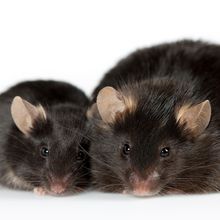microbiota

Garbage to Guts: The Slow-Churn of
Plastic Waste
Iris Kulbatski, PhD | Jun 1, 2023 | 4 min read
The winding trail of environmental microplastics leads researchers to the human digestive ecosystem.

Garbage to Guts: The Slow-Churn of Plastic Waste
Iris Kulbatski, PhD | Mar 13, 2023 | 4 min read
The winding trail of environmental microplastics is leading researchers to the human digestive ecosystem.

Fecal Microbiota Transplants: From Gut Infections to Psychiatric Disorders
The Scientist | 1 min read
Fecal transplants may help scientists improve current treatment strategies for anorexia nervosa.

Gut Microbiomes Offer Insights into Chronic Fatigue Syndrome
Shafaq Zia | Feb 21, 2023 | 2 min read
Levels of health-promoting gut bacteria are linked with severity of fatigue symptoms, a study finds.

Mice With a Healthy Gut Microbiome Are More Motivated to Exercise
Katherine Irving | Dec 16, 2022 | 4 min read
A neural pathway between the gut and the brain led to the release of dopamine when the mice ran on a wheel or treadmill, but only in the presence of a robust microbiome.

Modulating the Immune Response to Vaccines
The Scientist | 1 min read
Researchers uncover innovative natural approaches to fine-tune immunity from vaccination.

Obesity Protects Against Genital Herpes in Mice, Study Finds
Katherine Irving | Nov 11, 2022 | 3 min read
A high-fat diet induced changes to the animals’ vaginal microbiomes that boosted survival after exposure to the virus.

Human Gut Bacteria Show Up in Urban Wildlife
Bianca Nogrady | Sep 12, 2022 | 2 min read
The gut microbiomes of city-dwelling animals, including coyotes, lizards, and birds, show similarities to those found in humans who also live in urban environments.

Manipulating the Microbiome to Manage Disease
The Scientist Creative Services Team in collaboration with Tecan | 1 min read
Cammie Lesser will discuss how she turns a probiotic into a drug-delivering machine, while Andrew Y. Koh will describe the connection between the gut microbiota and cancer immunotherapy efficacy.

In Search of the Best Milk Recipe for Preemies’ Gut Bacteria
Alejandra Manjarrez, PhD | Aug 22, 2022 | 5 min read
Milk fortifiers of human origin show no evident advantage in the development of the gut microbiota of premature infants over fortifiers derived from cows, while the intake of the mother’s own milk does, two studies suggest.

What Happens to the Gut Microbiome After Taking Antibiotics?
Sophie Fessl, PhD | May 5, 2022 | 5 min read
Studies are finding that a single course of antibiotics alters the gut microbiomes of healthy volunteers—and that it can take months or even years to recover the original species composition.

Gut Molecule Linked to Decreased Myelination in Mouse Brains
Angie Voyles Askham, Spectrum | Feb 17, 2022 | 4 min read
A study shows that a molecule produced by intestinal microbes can enter the brain and that its presence is also associated with altered brain connectivity.

How Commensal Gut Bacteria Keep Pathogens in Check
Alejandra Manjarrez, PhD | Oct 14, 2021 | 7 min read
Recent studies describe how resident microbiota appear to outcompete unwelcome visitors, either with superior weaponry or by guzzling up local resources.

Infographic: Maternal Microbiota Has Lasting Effects on Offspring
Carolyn A. Thomson and Kathy D. McCoy | Aug 1, 2021 | 3 min read
Work in rodents shows that the bacteria living in a mother’s gut can produce immunomodulatory metabolites and influence the production of maternal antibodies—both of which can affect her offspring’s development.

The Role of Mom’s Microbes During Pregnancy
Carolyn A. Thomson and Kathy D. McCoy | Aug 1, 2021 | 10+ min read
Bacteria in the gut influence the production of antibodies and themselves secrete metabolites. In a pregnant woman, these compounds may influence immune development of her fetus.

Gut Microbes Help Coordinate Immune Activity in Mice
Catherine Offord | Jul 29, 2021 | 4 min read
The microbiota helps align a mouse’s innate immune system with its feeding patterns, prepping the animal to fend off infection when it’s most likely to be eating.

Bacterial Infections Disrupt Flies’ Sense of Smell
Abby Olena, PhD | Jul 21, 2021 | 4 min read
The temporary loss of olfaction stops the flies from eating any more of whatever it is that made them sick.

Human Blood Harbors Cell-Free Microbial DNA
Abby Olena, PhD | Jul 9, 2021 | 3 min read
After controlling for high levels of bacterial contamination in their lab and reagents, researchers detect microbial genetic material in plasma samples from healthy people and cancer patients.

Q&A: Eating Milk Chocolate in the Morning Boosts Fat Metabolism
Amanda Heidt | Jun 30, 2021 | 6 min read
A study of 19 postmenopausal women found that eating a bar of chocolate in the morning affected their bodies differently than eating it at night, but neither led to weight gain.
